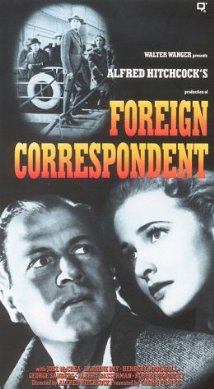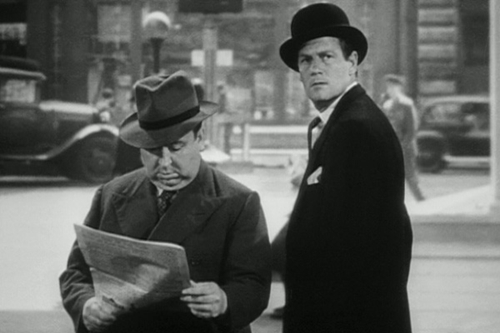“Foreign Correspondent” (1940) was recently released on Blu-ray/DVD (dual edition) by Criterion.
By Michael Wilmington
 Alfred Hitchcock started his American filmmaking career with a bang, directing a Best Picture Oscar winner and an inarguable classic: his 1940 David O. Selznick-produced film of Daphne du Maurier’s immensely popular Gothic romantic novel “Rebecca.” Though he was under the control of Selznick at his zenith (the year after “Gone With the Wind”), Hitch executed the assignment with near-flawless skill and panache.
Alfred Hitchcock started his American filmmaking career with a bang, directing a Best Picture Oscar winner and an inarguable classic: his 1940 David O. Selznick-produced film of Daphne du Maurier’s immensely popular Gothic romantic novel “Rebecca.” Though he was under the control of Selznick at his zenith (the year after “Gone With the Wind”), Hitch executed the assignment with near-flawless skill and panache.
He beautifully dramatizes du Maurier’s romantic tale of a naïve young wife (Joan Fontaine) taken to a mansion by her wealthy new husband (Laurence Olivier), who may have murdered his haunting first wife, Rebecca.
But “Rebecca” wasn’t Hitch’s only 1940 film. Nor is it the one that some Hitchcock critics (and maybe even Hitchcock himself) consider the inarguable classic. Shortly after completing “Rebecca,” and freeing himself from the fealty Selznick felt was owed to du Maurier’s novel, Hitchcock made a second American movie.
This new work was a continuation of the style and technique of the delightfully frightening suspense thrillers he’d made in England in the ’30s: notably “The 39 Steps,” “The Man Who Knew Too Much” and “The Lady Vanishes.”
That second Hitchcock movie was “Foreign Correspondent,” produced by Walter Wanger: a top-notch melodrama of international intrigue and nail-biting suspense that was set in the early days of World War II. Starring the sturdily all-American guy Joel McCrea (Hitch had wanted Gary Cooper) and love interest Laraine Day (Hitch had wanted Fontaine), it was a movie that unabashedly called for the U.S. to enter the war against Germany, on the side of Hitchcock’s beleaguered homeland Great Britain.
That’s the conclusion McCrea’s pugnacious but immensely likable reporter Johnny Jones (pen name: Huntley Haverstock) reaches after being sent overseas as The New York Globe’s foreign correspondent and witnessing Germany’s murderous espionage and sabotage. As bodies and evidence accumulate, Johnny/Haverstock chases down a Nazi spy ring in England and Holland.
In company with Johnny: the head of an ambiguous peace organization (Herbert Marshall), his beauteous daughter (Day), a suave and plucky British fellow reporter (George Sanders), a kidnapped Dutch diplomat (Albert Bassermann), and assorted spies, officials, killers and bystanders (Edmund Gwenn, Robert Benchley, Eduardo Ciannelli and others). They race from one hair-raising Hitchcockian set-piece to the next; finally culminating in a plane crash, with McCrea and others in the cockpit.
It’s the sort of convulsively paced, thoroughly engrossing and purely entertaining tale Hitchcock loved to make, with an audience-pleasing flair and imagination that would have been entirely out of place in a faithful classic adaptation like “Rebecca.” But “Foreign Correspondent” was a clear precursor of Hitchcock’s later career and also of the James Bond spy thrillers of the ’60s and beyond, which were partly inspired by his work.
Selznick would not allow Hitchcock to change any of “Rebecca” (except for his habitual joke-cameo appearance). While Selznick has probably been proven right by the film’s 1940 Oscars and continued classic status, “Foreign Correspondent” (which was nominated for six Oscars), has also been validated as the more truly Hitchcockian movie.
It’s full of virtuoso set-pieces, like the windmills that are turning against the wind, the climactic plane crash, the famed umbrella-knocking assassination scene, and other logic-defying moments inserted in defiance of the critics and carpers whom The Master of Suspense dismissively called “The Plausibles.”
“Foreign Correspondent” was scripted by Hitchcock’s regular collaborators Charles Bennett and Joan Harrison, with dialogue by James Hilton (the novelist who wrote “Goodbye Mr. Chips”) and the Algonquin Round Table’s resident wit Robert Benchley (who also appears in the cast as a fellow reporter). The source was an actual foreign correspondent’s memoir, “Personal History” by Vincent Sheean.
One of the uncredited writers on “Foreign Correspondent” was Richard Maibaum, who was later the main Bond series screenwriter. Besides Maibaum, the remarkable gallery of uncredited writers on the project includes Ben Hecht, Harold Clurman, John Howard Lawson, John Lee Mahin and Budd Schulberg, or almost everyone in Hollywood, it seems, but William Faulkner and F. Scott Fitzgerald.
Of course, there was the script-shaping genius of Hitchcock himself (and of his wife Alma): Hitchcock, who of all non-actor movie directors, is perhaps the most visibly present in his films. We sense him in and behind nearly every shot.
But he’s more present in “Foreign Correspondent” than in “Rebecca.” Freed for the moment from Selznick (they would make two more pictures together), Hitch charts the major direction he would follow right up to the end of his career: the ingenious set-pieces, the games with the audience, the personal touches and brilliant identification devices.
He also produced a film proselytizing for America’s entrance into the war with the Allies and against the Nazi juggernaut that was admired as propaganda by no less an expert than Joseph Goebbels himself.
Criterion’s extras include a 1972 interview with Hitchcock by Dick Cavett and a 1946 radio adaptation of “Foreign Correspondent” with Joseph Cotten.











From FNB readers